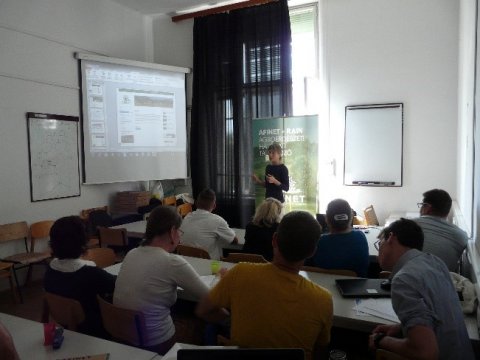The first Hungarian Regional Agroforestry Innovation Network meeting took place on 14 September 2017 in Szent István University (SZIE) Faculty of Horticultural Science in Budapest.
Vityi Andrea (project coordinator) and Fábián Zsófia (innovation broker - IB) from SoE-KKK -University of Sopron Cooperational Research Centre Nonprofit Ltd. chaired the meeting.
The event was attended by 10 participants, some of them practitioners. Alongside researchers and practicioners, within the group there were advisors, Rural Development technicians, representative of the Ministry of Agriculture, and member of the National Agricultural Research and Innovation Centre. The meeting started at 10:30 and lasts until 16:00.
First Zita Szalai from the Department of Ecological and Sustainable Production Systems (SZIE) and Zsófia Fábián IB welcomed the participants. Then Andrea Vityi shortly presented the AFINET project and the aim of the RAIN network. Zsofia Fábián described shortly the nine RAINs’ and their main activities throughout Europe. Afterwards, RAIN members introduced themselves and participated in a brainstorming exercise to identify the main problems Agroforestry systems are currently facing in Hungary, as well as the needs and lack of knowledge that should be addressed during AFINET’s development.
They all agreed on some issues which AFINET should be focused on. These are:
- the more precise definition of agroforestry expressions (creation of standardised terminolgy)
- better information spreading among the stakeholders and towards the farmers
- lack of Hungarian literature and therefore lack of knowledge about the possible cultivation technologies
- lack of knowledge about the possible plant association which are usable in agroforestry systems and demonstration sites
- need of a stronger marketing which makes this sector more attractive to the young generation
- need of an improved subsidy system
After the lunch, Vityi Andrea talked about the AFINET Knowledge Cloud and the use of it. Finally the group discussed the possible way of communication. First a google group will be used, but besides this, some other way of communication will be tried as well, such as: mailchimp, facebook, slack.
The group agreed that this activity will be useful only if the discussed problems and missing links will be handled in practise as well, therefore a stronger cooperation is needed.












